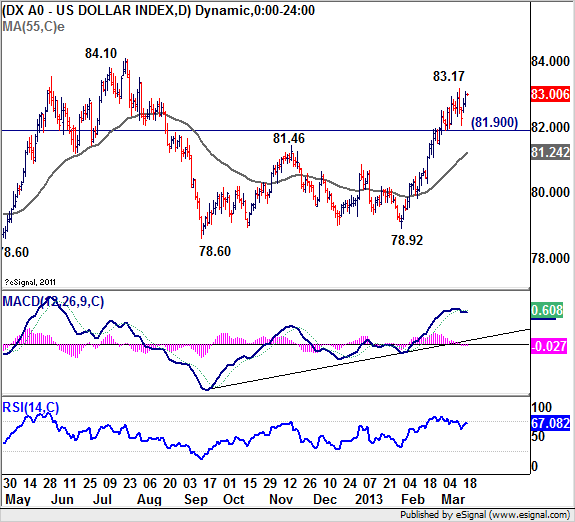The euro tumbled overnight after the Cyprus parliament rejected the bank levy plan tied to the countries' international bailout. The final version of the controversial plan intended to raise EUR 5.5b from deposit taxes, and excluded those with less than EUR 20k in their accounts. Not one single MP endorsed the plan. Cypriot President Anastasiades said "people think that it is unjust and it's against the interests of Cyprus at large". Dutch finance minister Dijsselbloem said he's disappointed by the outcome but noted that "the conditions of the proposal are still valid." He also pledged that the EU "stands ready to assist Cyprus in its reform efforts." An immediate question is on the ECB's stance towards Cyprus. After being downgraded to junk status by all three major rating agencies, Cypriot bonds were ineligible as collateral in ECB's refinancing operation last year. The banks turned to ELA from Central Bank of Cyprus, and the central bank was only allowed to lend to banks with ECB permission. The ECB governing council will meet today regarding the situation in Cyprus, and will decide to give the island country more time or cut off liquidity to the banks. Meanwhile, Finance Minister Sarris will fly to Moscow to present a plan to Russia, which is a major player in its banking sector.
The UK will be a major focus today: Chancellor Osborne is scheduled to deliver his fourth budget speech. Focus is on whether he will announce a push back to the debt-to-GDP ratio of 75% to 2017/18 fiscal year, as well as prolonged austerity beyond 2015. He could also mention measures that boost bank lending to businesses to strengthen the economy. The BoE will also release meet minutes, and attention will be on the vote for expanding the asset purchase program. The UK will also release job market data which will present a -5k fall in claimant count in February, while unemployment rate is expected to be steady at 7.8%. The sterling has somewhat stabilized in the past two weeks with the GBP/USD holding above 1.5 psychological level again. The pair also managed to stay below 0.88. The GBP/AUD recovered after hitting a historical low at 1.4380. The pound remains vulnerable to deeper fall against most major currencies.
FOMC rate decision will be another major focus. The Fed is widely expected to keep rates and the open-ended QE3 unchanged. The question is whether policymakers would be encouraged by recent improvement in the economy, particularly the job market. The Fed will also release its updated forecasts. Markets will be eager to know if the Fed will raise GDP projection and lower unemployment projection. Recent strength in the greenback was due mainly to risk appetite on dollar denominated assets. U.S. stock indices hit record highs on expectation of improvements in economy while Fed will maintain stimulus. The optimistic view from the Fed to maintain stimulus will give dollar and U.S. stocks a further boost.
The Dollar index retreated sharply last week after hitting 83.17, but quickly recovered. Near term outlook stays bullish as long as 81.90 minor support holds, and further rally is expected. It's still uncertain whether rise from 78.60 is resuming larger up trend from 72.69, or the second leg of consolidation pattern from 84.10. Iin either case, a retest of 84.10 would likely be seen in near term.

The UK will be a major focus today: Chancellor Osborne is scheduled to deliver his fourth budget speech. Focus is on whether he will announce a push back to the debt-to-GDP ratio of 75% to 2017/18 fiscal year, as well as prolonged austerity beyond 2015. He could also mention measures that boost bank lending to businesses to strengthen the economy. The BoE will also release meet minutes, and attention will be on the vote for expanding the asset purchase program. The UK will also release job market data which will present a -5k fall in claimant count in February, while unemployment rate is expected to be steady at 7.8%. The sterling has somewhat stabilized in the past two weeks with the GBP/USD holding above 1.5 psychological level again. The pair also managed to stay below 0.88. The GBP/AUD recovered after hitting a historical low at 1.4380. The pound remains vulnerable to deeper fall against most major currencies.
FOMC rate decision will be another major focus. The Fed is widely expected to keep rates and the open-ended QE3 unchanged. The question is whether policymakers would be encouraged by recent improvement in the economy, particularly the job market. The Fed will also release its updated forecasts. Markets will be eager to know if the Fed will raise GDP projection and lower unemployment projection. Recent strength in the greenback was due mainly to risk appetite on dollar denominated assets. U.S. stock indices hit record highs on expectation of improvements in economy while Fed will maintain stimulus. The optimistic view from the Fed to maintain stimulus will give dollar and U.S. stocks a further boost.
The Dollar index retreated sharply last week after hitting 83.17, but quickly recovered. Near term outlook stays bullish as long as 81.90 minor support holds, and further rally is expected. It's still uncertain whether rise from 78.60 is resuming larger up trend from 72.69, or the second leg of consolidation pattern from 84.10. Iin either case, a retest of 84.10 would likely be seen in near term.

